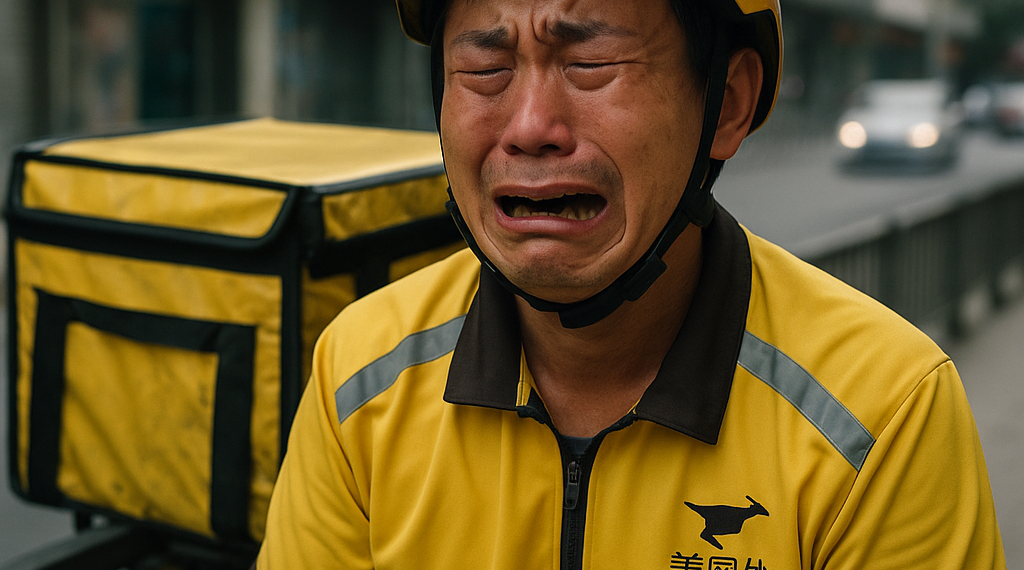In a moving viral video, a Chinese food delivery man breaks down while describing the emotional and physical toll of his job, echoing the silent struggles of millions.
BY PC Bureau
July 28, 2025: A Chinese delivery executive burst into tears in the middle of his shift and recorded a video to detail his struggle and one regret: dropping out of school at an early age. Dressed in his yellow uniform, the man shed light on the mental and physical strain he endured daily as part of the gig economy.
In the video that has since gone viral on Chinese social media platforms and Instagram, the deliveryman speaks directly to the camera, his voice trembling with exhaustion and suppressed emotion. “I deliver food for over 10 hours a day, exhausted like a dog,” he says. “I don’t dare slack off even for a second, because the moment I do, life punishes me with an empty stomach. How could I not feel anxious?”
Behind the bright yellow uniform and the trademark insulated delivery box lies a deeper, darker story shared by millions of China’s gig economy workers. The man’s tearful confession has touched a nerve, sparking renewed public discourse about the plight of food delivery workers in the world’s second-largest economy.
READ: Manipur: Kuki Body Demands Halt to Indo-Myanmar Fencing
With the explosive rise of platforms like Meituan and Ele.me, food delivery in China has become an indispensable service — especially during the pandemic and in the fast-paced lives of urban dwellers. But behind the convenience of a quick meal lies a sprawling, often invisible, army of delivery riders — or waimai xiaoge — who brave heatwaves, typhoons, traffic, and constant algorithmic pressure to deliver on time.
‘Exhausted Like a Dog’: The Meltdown of a Chinese Delivery Driver Reveals the Gig Economy’s Toll pic.twitter.com/MXJftt7e6R
— BreezyScroll (@BreezyScroll) July 27, 2025
There are an estimated 10 million delivery workers in China. Many come from rural backgrounds or underdeveloped provinces, drawn to cities by the promise of opportunity but often left grappling with low pay, no job security, and grueling conditions.
A Regret Etched in Sweat
“Despite my teacher’s warnings, I dropped out of school,” the delivery rider says in the video, pausing to wipe his tears. “Now I realise the importance of their advice.”
His regret is far from unique. Many of these workers, often in their twenties or thirties, did not complete formal education, limiting their options in an increasingly automated and competitive labor market. They turn to gig work — lured by initial promises of flexibility and earning potential — only to find themselves trapped in a punishing cycle.
These workers are not protected by labor laws in the same way formal employees are. There is no overtime, no paid leave, and no insurance against injury or illness. If they get into an accident, they pay out of pocket. If they miss a delivery deadline — even by minutes — their pay is slashed.
What makes the job even more unforgiving is the role of algorithms. Delivery times are calculated by systems that prioritize customer satisfaction over worker welfare. Routes are optimised not for safety but for speed, pushing riders to risk their lives weaving through crowded streets.
READ: After Abandoning HQ, Tengnou pal DC Caught in Kuki-Zo–Meitei Crossfire
In 2020, a report by Renwu magazine revealed the brutal efficiency of the system. Delivery workers were found to be shaving minutes off delivery times by jumping red lights and racing through pedestrian zones. “The system is squeezing us like lemons,” one rider told the magazine. “You keep running until there’s nothing left.”
In his video, the man’s voice falters as he describes the emotional toll. “I can’t give my parents the life they deserve,” he says. “I can’t even live the life the way I want either. It breaks my heart. But who can I even talk to about it?”
The anonymity of city life — the fast pace, the cold indifference — compounds the mental burden. Without formal employment benefits or a support system, many delivery workers feel isolated. Reports of depression and burnout are common, yet seldom addressed.
China’s rapid economic transformation has created unprecedented opportunities — but it has also produced deep inequalities and a vast underclass whose suffering is often invisible.
Public Outcry, Policy Inertia
The man’s video drew an outpouring of empathy online. Thousands of netizens commented, some sharing similar stories, others calling on the platforms to provide better protections. “He is not crying for himself alone — he is crying for all of us who are one illness or one accident away from ruin,” one user wrote.
In recent years, China’s government has acknowledged the plight of gig workers and introduced some regulations, such as requiring platforms to reduce algorithmic pressure and ensure riders earn minimum wage. But implementation remains patchy, and many companies continue to exploit loopholes by labelling riders as “independent contractors.”
The tearful confession of this young man — who may never be named but whose story echoes loudly — is more than just a personal tragedy. It’s a symbol of a generation that grew up during China’s economic boom but fell through its cracks. A generation burdened by inequality, left behind by education, and consumed by the very systems meant to uplift them.
In his last lines, the delivery man looks directly into the lens: “I wanted to be someone. I really did. But this is all I have now.”
His cry — raw, unfiltered, and deeply human — is a wake-up call for a society racing forward, but in danger of forgetting those who keep it moving.














